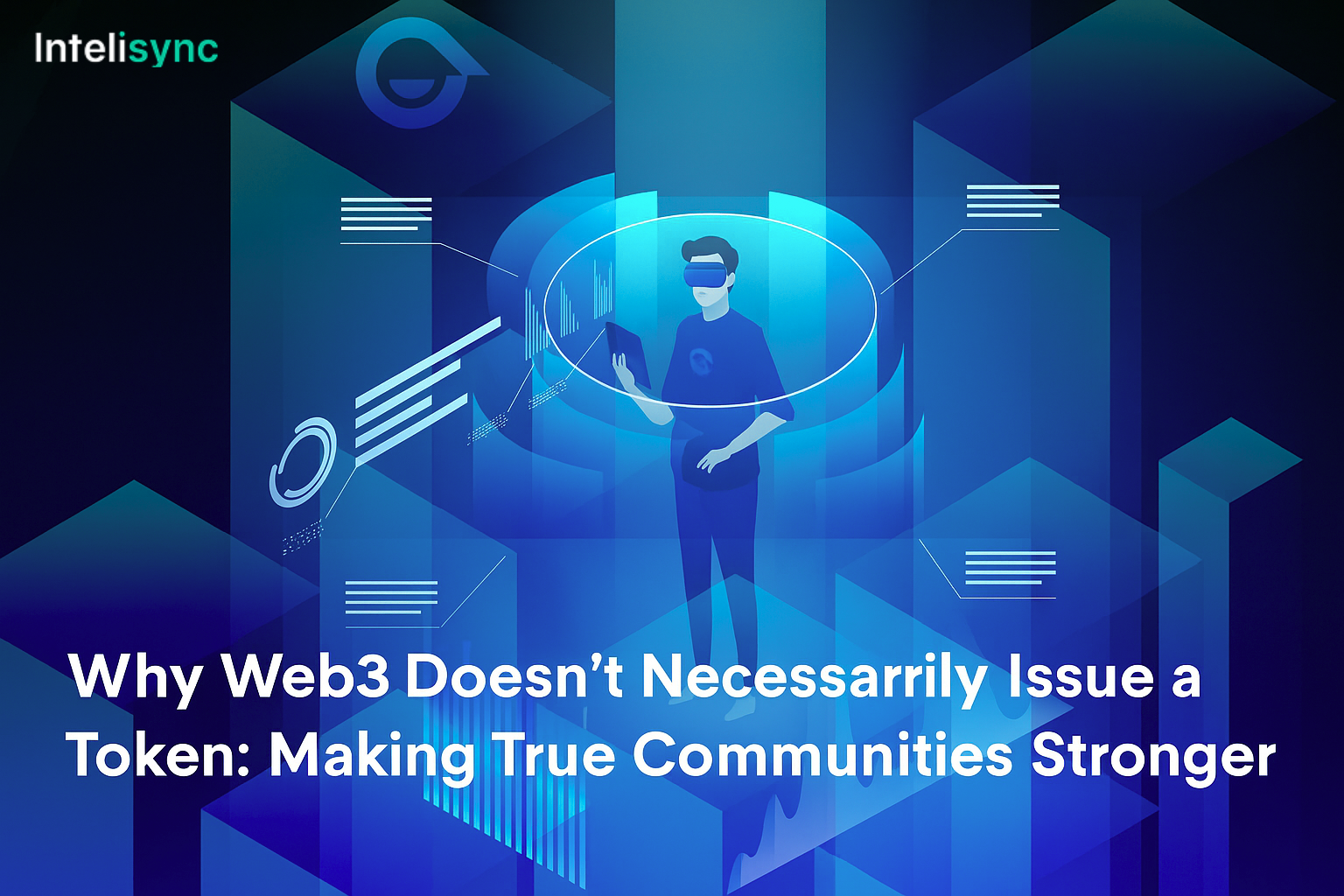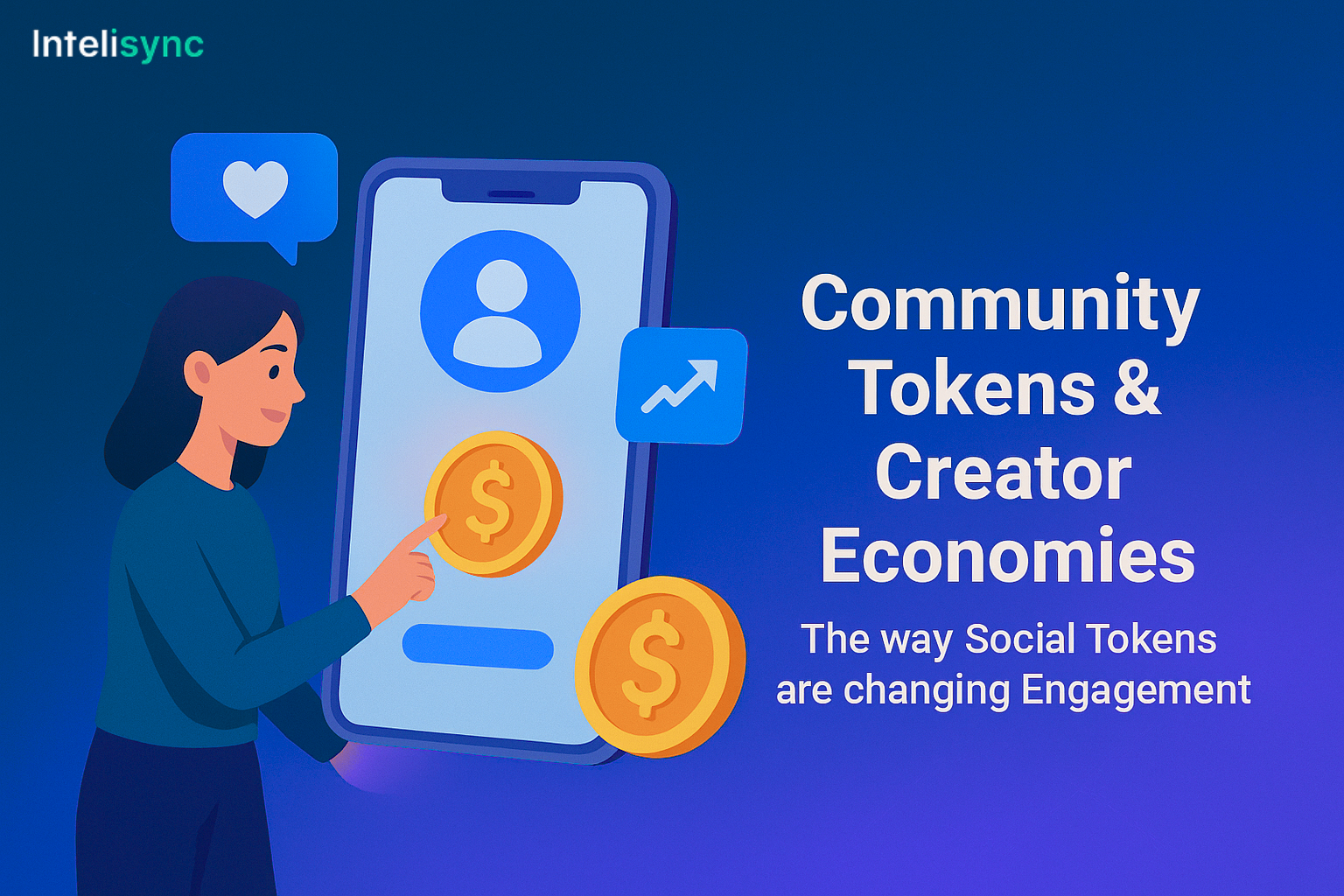Introduction: past the Token Hype.
In the past several years, tokens have been the defining aspect of Web3, either as fungible tokens, as in DeFi, as NFTs, in the world of art and collectibles, or as governance tokens, in the case of a DAO. Although tokens are effective instruments, not every community is based on such effective tools.
And in 2025 a new understanding is taking shape: Web3 initiatives will be able to prosper without the release of a token. The actual success is in creating communities based on trust, value and long term commitment rather than speculative assets.
This blog discusses the necessity of having a token in Web3, why real communities can be effective without it, and how Intelisync supports projects to build tokenless growth plans.
The Token Obsession in Web3
Reasons Why Projects Fail to Take off to Token Launches.
The use of tokens can be a rapid fundraising tool, which will give them liquidity and draw in attention. They also are associated with administration and rewards. But too frequently the projects introduce tokens without first having:
- A working product
- A strong community
- Clear use cases
This has caused temporary hype cycles that are disappointing at the end of the day when price of tokens decrease.
There is a Downside to Token-First Strategies.
- Value speculation: Traders are drawn to communities and not its users.
- Regulatory risks: Tokens have a high probability of being treated as a security.
- Unsustainable growth: Token rewards have the ability to develop dependency without commitment.
Cultivating Better Web3 Communities without Tokens.
Community as the Real Asset
In Web3, the token is not important, but the community. The tokenless community pays attention to:
- Shared goals and values
- Collaborative governance
- Viable use and interaction.
Tokenless Success EXamples.
- Early Days of Ethereum: Prior to the time ETH was easily marketed, its strength lied in an enthusiastic developer community.
- DAO-Like Structures, but no tokens: Community organizations structured through open-source and reputation and meritocracy.
Central Tenets of Tokenless Web3 Communities.
Value-Driven Engagement
Projects ought to be aimed at developing tools, platforms or experiences to address real problems. Tokens enhance value but not remove it.
Contributions and Not Speculation.
In tokenless communities, social capitals, reputation, and recognition are used to reward participation, and not just financial rewards.
Sustainable Governance
Off-chain governance tools (such as Snapshot, Coordinape, or systems in Discord) allow communities to use off-chain governance without governance tokens.
Web3 Doesn’t Need a Token.
Trust Before Tokenization
The powerful community first creates trust and credibility and then starts to introduce token incentives. This is because tokens can make engagement better instead of defining it.
Escaping Traps of Regulation.
By prioritizing the community, projects will avoid initial legal risks such as issuing tokens.
Building for Longevity
The models without tokens decrease the reliance on the fluctuations of the market, which enables the communities to aim at its mission-driven development.
Tokens Make (and Don’t) Sense.
Good Use Cases for Tokens
- Fairly rewarding contributors.
- Allowing decentralized governance.
- Forging digital economies liquidity.
Poor Use Cases for Tokens
- Artificially blowing smoke.
- Instead of actual community-building.
- Investment in the absence of a sustainable roadmap.
- The use of tokens must be a means not the end.
Alternative Web3 Community-Building Models.
Reputation Systems
Incentivizing contributions with reputation scores and leaderboards and on-chain credentials.
Integration of Digital Identity.
Reputations can be taken across platforms and decentralized identity (DID) ensures that users are no longer dependent on tokens.
Collaborative Platforms
Contribution-based DAOs, Gitcoin-type funding, or quadratic voting can be used in projects without the implementation of a token economy.
The Intelisync in the Construction of Tokenless Web3 Communities.
At Intelisync.ai we are aware that not all projects require a token to make it. We assist web3 projects through our services:
- Reputation and identity based tokenless systems of governance.
- Introduce decentralized identity to participate in a secure reputation-based way.
- Establish robust community infrastructure on Discord, Telegram and Web3-native platforms.
- Planning the token launches: Be responsible, at the right time and the society is prepared.
Intelisync helps communities to prosper with or without a token by steering projects towards sustainable growth.
The Problems of Going Tokenless.
Slower Early Growth
Tokens can be used as immediate rewards, and therefore tokenless societies can increase at a slower pace.
Retention Without Rewards
In the absence of money, projects need to work on value, culture and purpose in common in order to keep members.
Perception of Legitimacy
Other investors equate tokens with legitimacy. The problem of overcoming this perception needs to be achieved by the means of powerful branding and clear communication.
Tokenless Growth in the Future context of Web3.
Web3 is coming out of speculation in 2025. The utility, security and real engagement are what the users are focusing on as compared to token pumps. The tokenless models follow this change, showing that a Web3 adoption can be sustainable without a token being launched on day one.
With the growth of AI, decentralized identity, and a cross-chain infrastructure, projects need not need tokens value first, tokenization later.
Conclusion: Social Initiatives Vs Coins.
The most effective tool is a token, but it is not what Web3 is all about. It is all about communities trust, cooperation, and mutual purpose.
Web3 projects could create robust ecosystems that are here to stay, rather than unstable speculative based economies, by going beyond token obsession.
And at the moment of tokenizing, such tools as Intelisync make it sustainable, secure, and strategic making communities long-term, token-powered ecosystems.






